Legend has it that the infamous Roman emperor Caligula was unhinged to the point that he sentenced people to death for forgetting his birthday. But stories like this may have been more fiction than fact.
Gaius Caesar Germanicus, better known as Caligula, was 24 years old when he became the third Roman emperor in 37 A.D. But the young man ruled for only four years until he was brutally slain alongside his wife and daughter by a group of guardsmen and dumped into a shallow grave.
His nickname “Caligula” translates to “Little Boot.” The unsuspecting monicker might have you believe that the emperor was something of a benevolent leader, but his historical record begs to differ. The third emperor reintroduced treason trials and performed public executions.
We spoke to award-winning historical writer and biographer Stephen Dando-Collins, whose upcoming biography Caligula: The Mad Emperor of Rome explores just how extreme the ruler was.
Regardless of whether Caligula actually hosted orgies or made parents watch as their children were killed, Dando-Collins concludes that he was nonetheless a dangerous man to know. Indeed, with Caligula, “friendship and loyalty would not save you if he turned on you in the late stages of his reign.”
Caligula’s Complex Family History
Gaius Caesar Germanicus was born in Antium (modern-day Anzio), Italy on August 31, 12 A.D. He was the third of six living children born to his father Germanicus and mother Agrippina the Elder. The boy was born into unimaginable nobility, as his family was the most esteemed in all of Rome — and his great-great-grandfather was none other than Julius Caesar.
Both Gaius’ great-grandfather Augustus and father Germanicus were largely heralded and respected in their times, but his legacy would be a sadistic one.
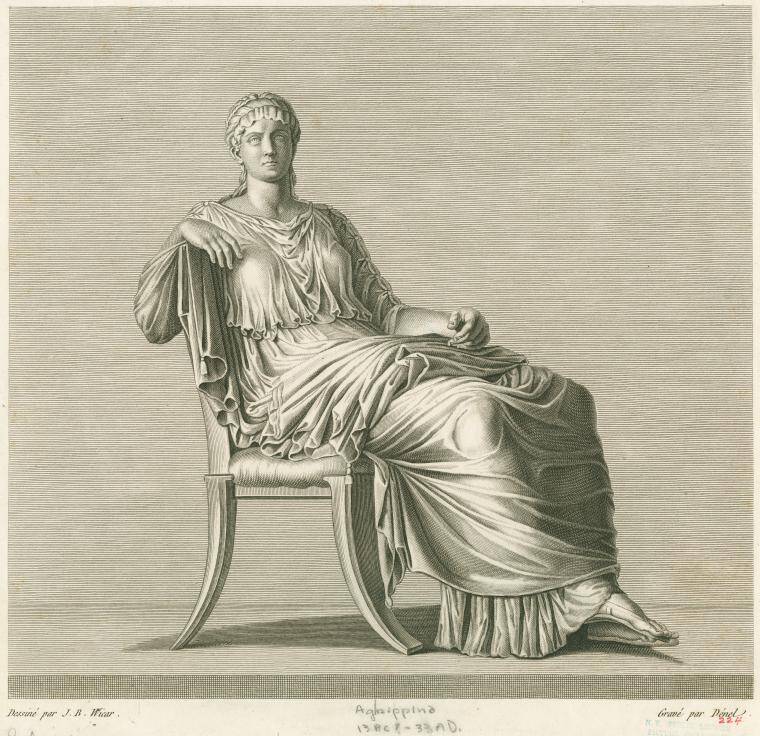
New York Public LibraryA depiction of Caligula’s mother, Agrippina, who was imprisoned and starved to death for accusing the reigning emperor Tiberius of murdering her husband, Germanicus.
The reign of Augustus, the first emperor, was nearing its end when Caligula was born. With Augustus had come the beginning of a new Roman rule, one under a single leader, that also pushed Rome’s ruling elite somewhat into chaos. Tiberius, Augustus’ stepson, had little desire to become emperor. As such, the heir to the throne rested on Augustus’ teenaged grandsons, both of whom would die before Augustus himself.
A reluctant Tiberius was adopted as full son and heir, required to adopt his nephew Germanicus in order to continue the bloodline and to take the crown upon his stepfather Augustus’ death.
When Augustus died on August 19, 14 A.D., however, Tiberius assumed power and sent Germanicus to the eastern provinces.
Germanicus brought Gaius Caesar Germanicus, as young as three, along with him on his military campaigns. Gaius was a loyal little soldier, then, and his eternal nickname “Caligula” was born while on these campaigns as he’d wear a military uniform replete with little boots, and subsequently became a sort of mascot to the troops.
But in 19 A.D., however, Germanicus fell ill and died. It’s believed by Suetonius, a biographer of Caligula’s largely believed to have begotten his infamous legacy, that Germanicus was actually poisoned on the orders of Tiberius who feared the latter was a political rival.
Agrippina pushed this narrative — a move that later cost her life.

Wikimedia CommonsCaligula’s nickname stemmed from the little boots he wore as a child while accompanying his father on military campaigns.
Perhaps desperate to shut the narrative down, Tiberius banished Agrippina to prison on a remote island. She starved to death, after which the emperor imprisoned her two elder sons.
One of them committed suicide and the other starved to death just as his mother did. “Little boot” Caligula and his sisters, however, were spared violent retribution as they did not appear to be immediate threats. He was sent to live with his great-grandmother Livia, who would soon die, leaving Caligula to the care of his grandmother Antonia.
The future emperor’s famed history of incest is believed to have started during this time. Caligula was now a teenager and is rumored to have engaged in ancestral relations with his sister Drusilla while the two lived with their grandmother. Whether or not Caligula truly did engage in incest, however, is debated.
When Caligula came of age between 18 and 19 years old, Tiberius felt it necessary to garner the young man’s loyalty. Tiberius summoned Caligula to the island of Capri where, by conflicting accounts, was either treated like a prince or a prisoner by the emperor.
Becoming Emperor Caligula

Wikimedia CommonsDrusilla, Caligula’s sister, is seated to the right of Felix, who is center. Some say she and her brother engaged in incest, though author and historian Stephen Dando-Collins is dubious.
It could be that Gaius Caesar Germanicus was simultaneously treated like a prince while forced to remain on the island as Tiberius’ prisoner. This cognitive dissonance and confusing treatment perhaps left Caligula traumatized, according to several historians.
It’s thought that during this tumultuous period in Caligula’s life, he began to relish in the macabre.
“Even in those days Caligula could not control his natural brutality,” Suetonius wrote. “He loved watching tortures and executions; and, disguised in wig and robe, abandoned himself nightly to the pleasures of feasting and scandalous living.”
The man’s unleashed id became so apparent that even Tiberius made mention of it. “I am nursing a viper for the Roman people,” he said.
Tiberius fell ill in March of 37 A.D. and died a mere month later. Even though the public strongly considered that Caligula may have been an impetus in his death, they were overjoyed. It was believed that Caligula — the son of Germanicus, a military man beloved by the Romans — would likely display the same honorable traits and behaviors as his father. The Roman Senate strongly concurred with that notion.
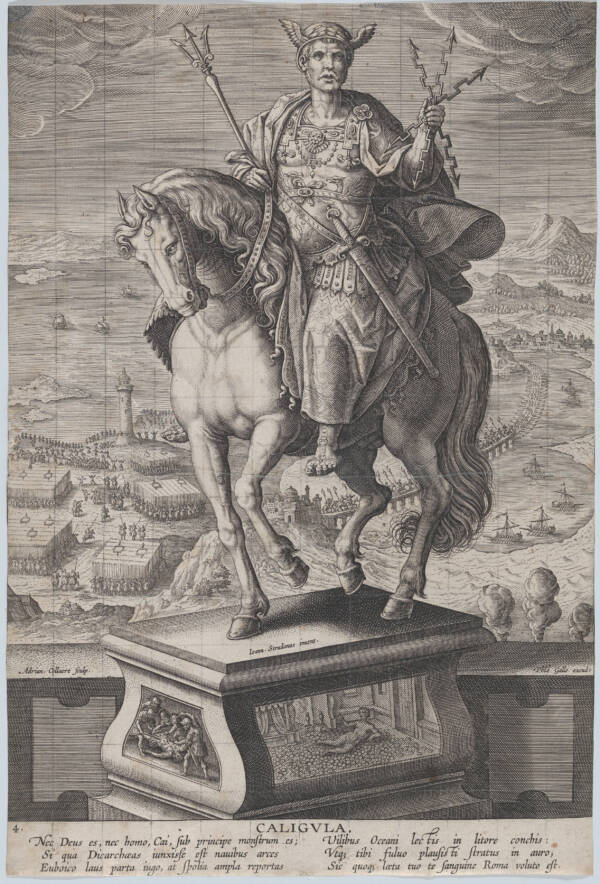
Pubic DomainCaligula in a winged helmet and holding double-headed arrows before a military scene in the background, even though the emperor had no military experience.
But Caligula, 24 years old at the time, had no experience in war, diplomacy, or government. He was nonetheless named sole emperor of Rome.
At first, Caligula’s reign was well-received. He freed those his predecessor had unjustly imprisoned and eliminated a universally unpopular tax. He ushered in a bountiful era of public events that ranged from chariot races and boxing matches to plays and gladiatorial fights.
Six or seven months into his reign, however, everything changed.
Caligula fell so ill that he teetered between life and death for a solid month. He did recover in October of 37 A.D., but whatever had ailed him had apparently left him largely unrecognizable.
Caligula had become more paranoid. He raised taxes to pay for his lavish lifestyle. He retreated to his behaviors on Capri, and with that, the hedonistic ruler infamous today was born.
Cruel And Delusional After Escaping Death
According to Ancient Origins, Caligula’s illness has been greatly debated. Some historians believe he was poisoned, while others have staunchly contested this. To other accounts, he perhaps experienced a breakdown or an epileptic seizure.

Wikimedia CommonsWhen he first took power, Caligula hd the ashes of his mother and brother moved to the sacred tomb of his ancestors.
Whatever the cause, historian and author Stephen Dando-Collins found through his own research that Caligula’s illness caused an indisputable change in his temperament.
“Only after Caligula suffered a near-fatal illness seven months into his reign did his personality and ruling style change dramatically,” Dando-Collins posited. “Soon, everyone and everything irritated him. Eventually, when the crowds at chariot races supported teams other than his favorite Blues team, he spoke, only half-jokingly, of executing the lot of them.”
Indeed, Caligula killed anyone who displeased him, regardless of how close they were to him. He executed his cousin and adopted son, Tiberius Gemellus. Caligula’s grandmother was infuriated at the deed, and, of course, died shortly after expressing that fact.
As with most of these sudden deaths that surrounded Caligula’s life, a debate rages on as to whether or not the woman committed suicide or was, indeed, poisoned by the emperor. The former could still very much be pinned on Caligula, as the tyrannical ruler had a way of intimidating people to death.
“Remember that I have the right to do anything to anybody,” he’d remind people.
He did just this. He purged anyone who appeared loyal to the prior emperor, including his own wife. He’d reprehend landowners just so that he could take their belongings.
But it was the other members of the Roman senate who appeared to suffer the most. Caligula allegedly executed two consuls for forgetting his birthday. It was virtually impossible for senators to decipher how Caligula might react to any given matter.
“He had double standards,” Dando-Collins reported. “He personally wrote detailed prosecution indictments for cases in the Roman Senate, considering himself the best legal mind of his day, only to summarily execute many people without hard evidence. And while he complained about the rulings of the Senate, he never overturned those rulings, even though he had the power to do so.”
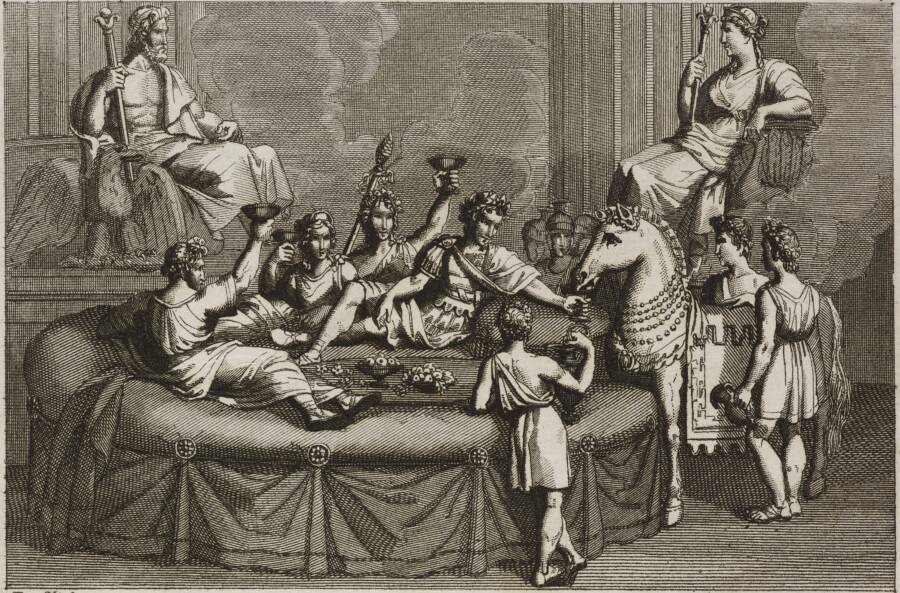
Persichini. Icas94/De Agostini Picture Library via Getty ImagesCaligula give his horse Incitatus a drink during a banquet.
Caligula is also said to have literally declared himself a living god. Not only did he dress as gods and demigods like Hercules, Mercury, Venus, and Apollo, but he ordered a bridge to be built that connected his palace to the Temple of Jupiter.
He once declared to the Senate that he’d be moving to Egypt because, in Egypt, Caligula asserted, he’d be worshipped as a living god. Naturally, soiling the Roman Empire’s corridors of power with such madness wasn’t well-received by virtually anyone.
It’s said Caligula forced the parents of those he executed to watch their children die, that he ordered the heads of various statues removed and replaced with his own, and that he seemed to have more affection for his horse, Incitatus, than for even his wife or daughter. Caligula treasured the steed so much that he gave it its own house — with an ivory manger and a marble stall.
As legend has it, the emperor even intended on making Incitatus a consul.
The narcissism didn’t end there. Caligula often referred to himself as a god during political meetings and was even registered as such in public documents recording his attendance or appearance. He dissolved pearls in vinegar for sustenance, gave his horse a jewel-encrusted collar, and declared war on the ocean — the legends are endless.
But just how far Caligula’s taste for extremism and excess goes is still hotly debated.
Just How “Mad” Was This Mad Emperor?
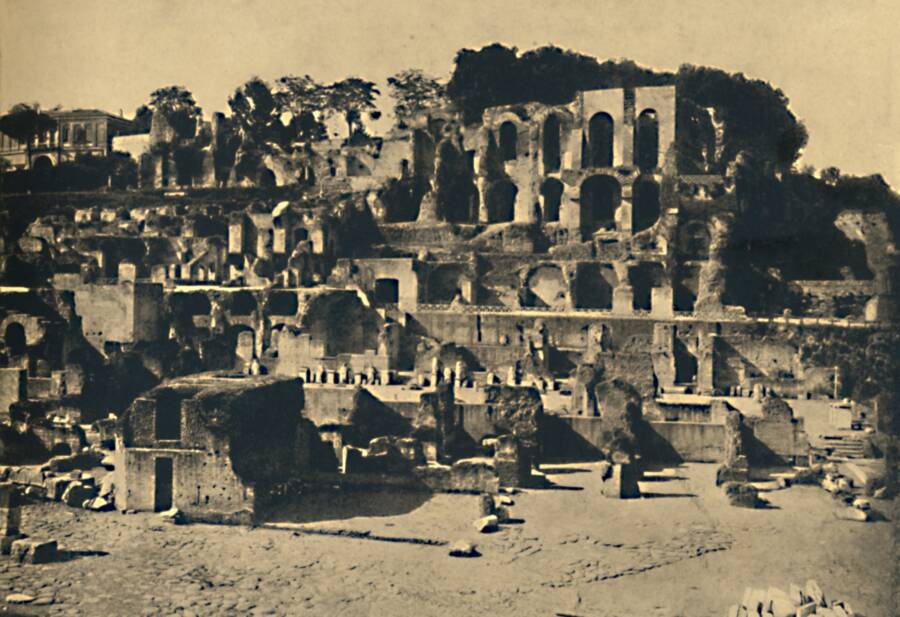
Enrico Verdesi, Rome, 1910/Photo by Print Collector/Getty ImagesThe ruins of the house of Caligula as photographed in 1910. Caligula allegedly had a bridge from his home built to the temple of Jupiter to illustrate his divine power.
In a biography by Aloys Winterling, Caligula: A Biography, the limits of Caligula’s insanity are drawn to suprising degree.
“By no means do all modern authors assume Caligula was insane,” Winterling wrote. Instead, the reputation of the “mad” emperor could have been one fabricated by political rivals.
Some historians have posited that Caligula was simply insane, but do not pinpoint any specific condition. One theory suggests epilepsy as the main cause of his headaches and that he was perhaps deathly afraid of impending seizures.
Caligula was known to speak to the moon, which was the celestial body thought to be connected with seizures during his time.
Others have focused on Caligula’s impatience and irritability, as well as a recorded penchant of his for staring into the distance. They believe he suffered from hyperthyroidism, which also commonly leads to headaches. Indeed, at some point in his reign, Caligula was said to have been plagued with headaches.
For his part, Dando-Collins asserts that Caligula could have been insane, but because he was driven so by a mental disorder. “His recorded symptoms suggest he did in fact suffer from bipolar disorder,” Dando-Collins reported. “He was diagnosed with epilepsy as a child, but his bipolar symptoms escaped diagnosis because the condition was unknown to physicians in his day.
According to Dando-Collins’ account, Caligula would have developed paranoia as part of bipolar disorder. But growing up in the environment Caligula experienced, rife with murder, execution, and suicide, anyone could have become paranoid.
“He only survived to become emperor by chance,” Dando-Collins concluded. “And his only ambition to that point must have been to survive.”
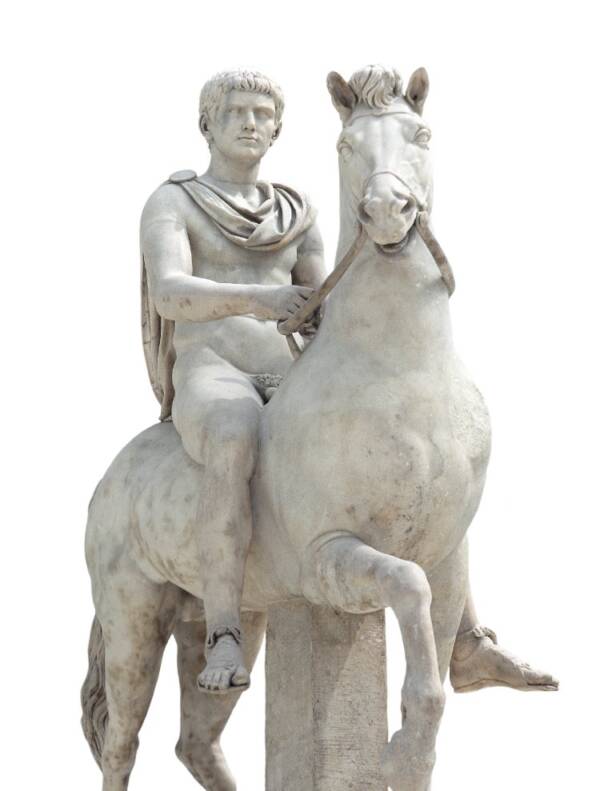
British MuseumLegend has it that Caligula loved his horse Incitatus so much he planned on anointing it to high office. Some historians, like Stephen Dando-Collins, assert that this is just legend.
“Most of the myths are just that, myths.” Dando-Collins asserted.
For one thing, it’s important to remember that Caligula’s real name was “Gaius.” “The Roman people knew him as the emperor Gaius. Later detractors used Caligula as a way of ridiculing him,” Dando-Collins added.
Caligula also didn’t make his horse a senator, but he did name his favorite chariot racing horse a member of a religious order. “As a joke,” Dando-Collins was sure to add.
Caligula didn’t host orgies, but that was in part because Tiberius, who was actually a known pedophile, forced him to have sex with male prostitutes as a teenager. “One of the first things Caligula did once he became emperor was ban those male prostitutes from Rome.”
Finally, Dando-Collins was quick to dispel the myth of incest. “He didn’t have sex with all his sisters. He may have fooled around with his favorite sister Drusilla as a teenager, but even that is debatable.”
Caligula was far from a fair ruler, Dondo-Collins maintained. “Countless people died or were ruined as a result of his whims or paranoia. Apart from the early months of his reign and some innovative public infrastructure initiatives, he was a disaster as an administrator and leader.”
“Caligula indeed became cruel, capricious, and, yes, crazy.”
Caligula’s Assassination
Whether it was poison, trauma, mental illness, overblown rumors, or coming of age in a toxic environment, Caligula’s behavior nonetheless left him unpopular.
On January 24 of 41 A.D., the emperor was assassinated by a group of guards after the Palatine Games celebrations.
The first to stab Caligula is said to have been Chaerea. Whether or not that is the case, the mad emperor was stabbed more than 30 times and died on the spot. He was then tossed into a shallow grave — before his wife and daughter were treated to the same fate.
But Caligula’s death wasn’t enough for those who were fed up with his reign. The Senate was eager to rid history of the man. They ordered the destruction of his statues and propped up a new Republic under the reign of Caligula’s uncle, Claudius, who was found cowering behind a set of curtains while Caligula and his immediate family were executed.
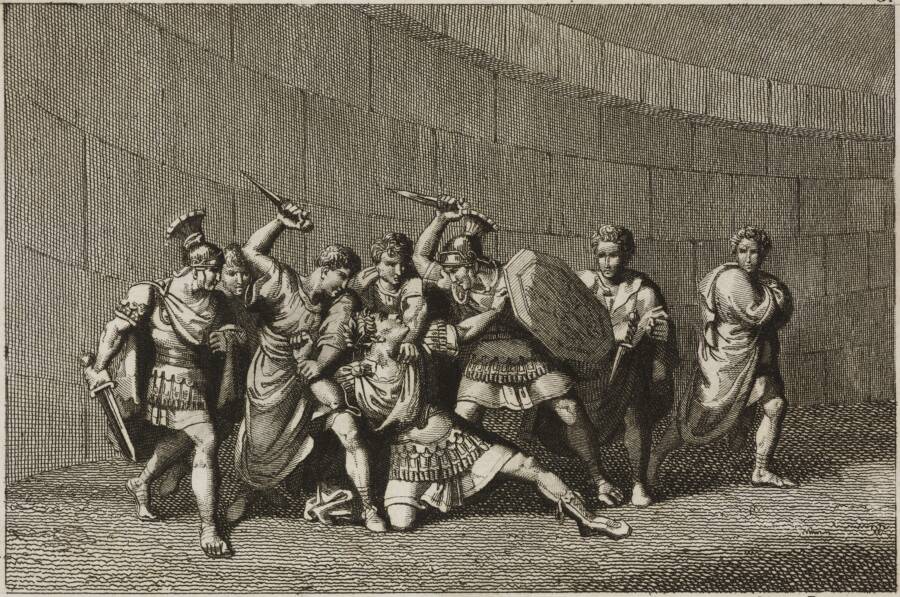
Persichini. Icas94/De Agostini Picture Library via Getty Images.Caligula is stabbed to death.
Oddly enough, the people of ancient Rome were actually angry when Caligula was murdered. Revenge against the traitors who killed him was called for — which Caligula’s successor, his uncle Claudius, heartily provided.
On The Silver Screen
Readers might be familiar with the 1979 arthouse film Caligula, but the truth here is truly stranger than fiction.
Tinto Brass’ 1979 film is a historical drama that some have relegated as cinematic erotica. With Malcolm McDowell as the eponymous emperor and Helen Mirren as his fourth wife Milonia Caesonia, the film doesn’t shy away from depicting the kind of depravity legend had assigned to Caligula.
As one might expect from such Hollywood fare that admittedly is more avant-garde than say, Stanley Kubrick’s Spartacus, the film is riddled with inaccuracies — which Dando-Collins has no qualms in pointing out:
“The 1979 film was produced and co-written by Penthouse publisher Bob Guccione, who set out with co-writer Gore Vidal to make it as gory and sexually titillating as possible. Apart from portraying Caligula as a deranged twenty-something emperor of Rome, they got just about everything else wrong.”
For one thing, the film has a scene in which Caligula cuts the fetus of his child with his sister, Drusilla, out of her body. He then kills her and eats the fetus. This scene is “great if you’re a horror film fan,” Dondo-Collins said, but not so great when it comes to historical accuracy.
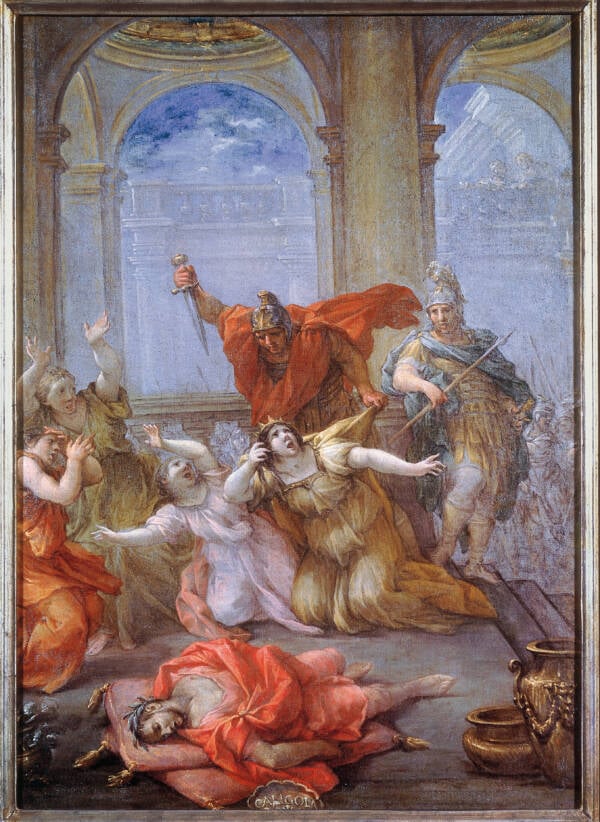
Lazzaro Baldi (1624-1703). DeAgostini/Getty ImagesCaligula lies dead in the foreground after having already been executed, while his wife and daughter are murdered beside him.
“Drusilla died in a pandemic, and as far we know wasn’t pregnant at the time. Caligula was devastated by her death and had her declared a goddess, but that’s as far as his devotion to her went,” he concluded.
But because history is often written only by the victor, what we glean about Caligula’s legacy in popular culture is rife with bias, or capitalizes on the potential seediness and sexiness of his reign.
What The Facts About Caligula Can Teach Us Today
Stephen Dando-Collins reported that he found numerous similarities between Caligula and Donald Trump. Though the former was 24 when he was anointed and the latter 70, the historian has observed several parallels in their behaviors.
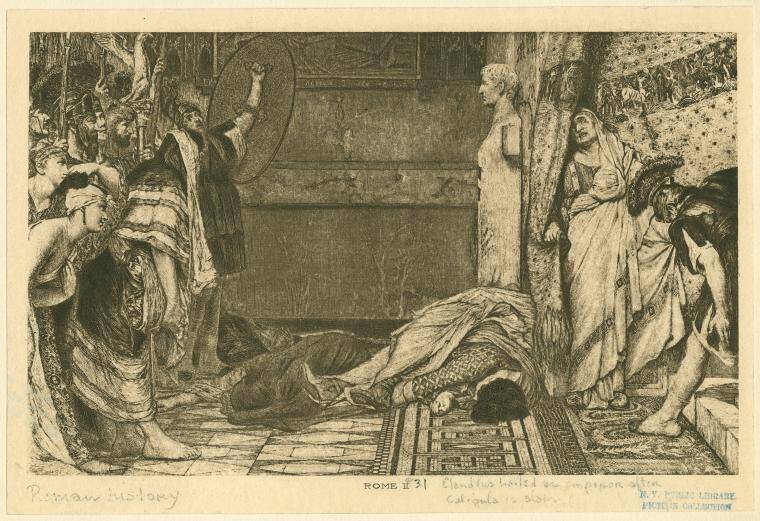
New York Public LibraryClaudius crouches behind a curtain as Caligula lies assassinated before him. He does not know yet he’s about to be named the new emperor.
“If a Roman wanted to honor someone on meeting them, or ingratiate themselves with them, they gave the other person the upper hand in the handshake — deliberately offering their right hand palm up, so that the other person had the dominant position, palm down,” Dando-Collins wrote.
“In observing the meetings of President Trump with world leaders over the past two years, I noticed that he yields the upper hand to some. But he gives a straight up and down handshake to others — mostly female leaders such as Theresa May and Angela Merkel. And who is the person Mr. Trump most often yields the upper hand to? Russian President Vladimir Putin.”
When asked whether Richard Nixon or Dick Cheney would be apter leaders, the author disagreed and provided some context regarding the two figures.
“There are no real parallels between Richard Nixon and Caligula other than the fact that both were corrupted by power. Dick Cheney can be compared to Sejanus, head of the Praetorian Guard under Caligula’s predecessor Tiberius. Sejanus manipulated the emperor and virtually ran the empire from his subordinate position. In the end, Tiberius was tipped off by Caligula’s grandmother that Sejanus was planning to overthrow him, and Sejanus was executed — whereas Cheney the puppet master and pliable George W. Bush both went into comfortable retirement.”
“The primary lesson,” Dando-Collins concluded, “despite massive advances in knowledge and technology, human nature has not changed in two thousand years.”
After learning about Emperor Caligula, read about Hypatia of Alexandria, an ancient Greek intellectual killed for her beliefs. Then, learn about the incredible true story of Charles Van Doren and the Quiz Show scandals.






